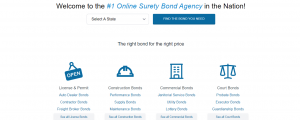
At SuretyBonds.com, we’re passionate about helping entrepreneurs make their dreams a reality. Because we work with new business owners every day, we understand that starting a small business can feel overwhelming. So, we made this nine-step guide and small business start-up toolkit to help you navigate the process.
9 Steps to Start Your Small Business
Here are nine steps to help you launch and scale your start-up, along with accessible resources and tools to implement each.
Step 1. Meet Legal and Licensing Requirements
Before anything else, you must ensure your business follows all legal regulations. Here are some sources to help get your business established and licensed:
- LegalZoom: Provides business/legal advice and filing of required paperwork
- Rocket Lawyer: Offers online legal documents and advice to help you incorporate your business and maintain compliance with licensing laws.
Step 2. Get Small Business Bond and Insurance Coverage
Most businesses must purchase insurance and many licensed business owners need to file a surety bond to protect their customers. The insurance and bond coverage you need depends on your location and business type. Check out the links below to begin the bonding and insurance process:
- ContractorBonds.com: An extension of SuretyBonds.com that issues contractor bonds to people across the country
- Travelers Insurance: Provides both bonds and insurance for individuals and businesses
- Nationwide Insurance: A nationally available online insurance provider
- SuretyBonds.com: The nation’s top provider of surety bonds that helps small business owners get bonded quickly and affordably
Step 3. Set up Accounting and Finance Systems
You’ll need an efficient system to track sales transactions and employee payroll. Here are a few online tools that can help you manage your finances:
- Gusto: An affordable small business HR solution for hiring and payroll
- Quickbooks: An all-in-one online accounting, payroll and bookkeeping system
- Wave: A fast and easy online accounting resource made for entrepreneurs and small businesses.
- Xero: An online accounting software for all business types featuring time-saving tools to grow small businesses.
Step 4. Launch and Optimize Your Website
Setting up your website is important to set a strong impression for your business and allow customers to learn about your company. Here are some low-cost and user-friendly website hosting solutions:
- BlueHost: Provides website hosting and building. BlueHost offers different plan options and features depending on your business needs.
- Shopify: Enables you to start an online store while managing all sales, shipping and payments.
- WordPress: Allows you to host, design and publish a custom website from a template. WordPress offers free and paid-for domains based on your business needs.
Next, optimize your website for search using SEO tools to boost online traffic:
- Google Analytics: Allows you to measure traffic, conversions and sessions for each URL on your website.
- MOZ Tools: Offers free SEO tools to perform website analysis, keyword research and competitor research.
- SEMRush: Provides SEO research tools for both your website and social media accounts. Paid subscriptions allow for competitive analysis.

Step 5. Provide Customer Service Support
Customer satisfaction is critical for the success of a small business. Here are a few online tools that help streamline customer service support:
- ClickDesk: A free service that allows businesses to live video chat with customers.
- Nextiva: Business phone solutions for small business owners.
- Salesforce: Customer support software that integrates AI and chatbots. Features scalable business tools including multi-channel support and productivity tips.
- Zoho: Implements AI and omnichannel technology to help connect businesses with clients easier and faster.
Step 6. Use Design Tools for Marketing
Design elements are important for marketing efforts across your website, social media and print materials. Free online tools that help create effective and compelling designs include:
- Adobe Firefly: This free Adobe product lets you create and edit copyright-free, AI-generated images.
- Canva: Easily create custom designs for your marketing strategy using Canva’s suite of online design tools. Free and paid options are available.
- Pexels: A free stock photo and video site to help create aesthetic marketing materials.
Step 7. Build Project Management Workflows
As you scale your business, organizing tasks and projects across the company gets complicated. Onboard one of the resources below to create effective workflows:
- Monday.com: Offers project management workflows to manage tasks and processes across all business functions, including a sales CRM
- Notion: Provides a free workspace to build custom project management workflows with AI integrations. Paid add-ons are available.
- Trello: Helps organize tasks with team sharing, timelines and project calendars
Step 8. Streamline Operations
If you begin hiring more employees, communication and integration tools become vital to day-to-day operations. These operational tools can help your small business increase performance, efficiency and productivity:
- Google Apps: Online productivity tools for small business collaboration and management
- Jira: An Atlassian software to create, assign and manage tasks in one place.
- Slack: A communication tool that allows you to instant message your employees 1-on-1 or in groups.
- Zapier: Integrates multiple apps and data points to help you streamline your work and processes.
Step 9. Generate and Organize Sales Leads
Generating and tracking the sales leads required to maintain your cash flow and keeping track of revenue can be difficult. Instead of relying on a spreadsheet, use the technologies below to simplify the lead generation and management processes:
- Square: Makes the selling process quicker with advanced sell-anywhere POS systems.
- Zoho CRM: Helps increase sales efficiency and improve client relationships through sales and consumer analysis to determine how to follow up with leads. A free version is available for small teams.
How Do I Get a Bond for My Business?
If you need a bond for your small business, visit our small business bonds guide to learn more and find the bond you need. SuretyBonds.com makes the bonding process for start-ups easier and quicker than any other provider.


Be the first to comment on "Small Business Startup Toolkit (31+ Tools)"